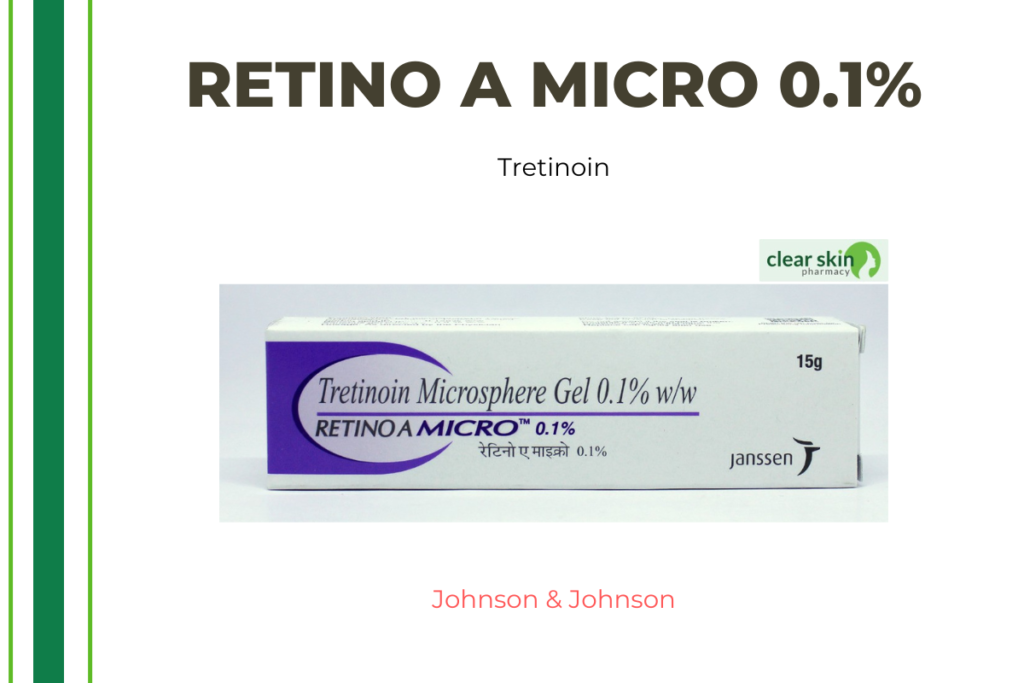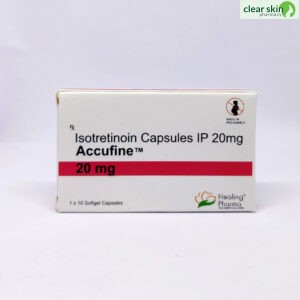Retino A Micro 0.1%
Retino A Micro 0.1%, also known as retinoic acid, belongs to the class of drugs known as retinoids (synthetic or man-made vitamin A). Cream containing 0.05 percent Retino A The most common uses for 20 grams are acne (pimples), sun-damaged skin, and leukemia (blood cancer). Acne is a common skin disorder caused by the clogging of hair follicles with dead skin cells and oil. Leukemia, a form of blood cancer, is caused by an increase in white blood cells (WBCs) in the body.
Cream containing 0.05 percent Retino A 20 g is a type of vitamin A that reduces oil secretion in the skin, thereby loosening and unclogging pores on the surface of the skin. This prevents the formation of zits, whiteheads, and blackheads. Additionally, Retino A Micro 0.1% inhibits the overproduction of abnormal blood cells while stimulating the growth of mature, normal blood and bone marrow cells. Retino A Micro 0.1% is a form of Retino A that is administered orally and is used to treat leukemia (a type of blood cancer).
20 grams of Retino A Micro 0.1% cream is available in both topical and oral formulations. Retino A Micro 0.1% should be taken precisely as prescribed by a physician. Apply a topical formulation of Retino A Micro 0.1% to the affected area using the fingertip. Nose, mouth, eyes, ears, or vaginal areas should not be treated with Retino A Micro 0.1%. If Retino A Micro 0.1% comes into contact with certain areas unintentionally, thoroughly rinse with water. Some individuals frequently experience dry skin, peeling, redness, burning, itching, or stinging sensations. The majority of these Retino A Micro 0.1% adverse effects do not necessitate medical attention and will subside over time. Please consult your physician if the adverse effects persist or worsen.
Please let your physician know if you are allergic to Retino A Micro 0.1% or any other medications. Consult a physician prior to using Retino A Micro 0.1% if you are pregnant, nursing, or planning to become pregnant. Avoid sun exposure while using Retino A Micro 0.1%, as it may make your skin more sensitive to sunlight and cause sunburn. Utilize protective gear and sunscreen (SPF) when venturing outdoors to prevent sunburn. Do not use more Retino A Micro 0.1% than is recommended, as doing so will not produce faster or better results, but rather peeling, redness, and skin pain. Patients with a history of depression, eczema, skin cancer, or a fish allergy should use Retino A Micro 0.1% with caution.
Leukemia, acne, and wrinkles are all treated with Retino A Micro 0.1%. (blood cancer)

Medicinal Advantages
Cream containing 0.1% Retino A Micro is a type of vitamin A (retinoid) that reduces oil secretion in the skin, thereby loosening and unclogging the skin’s surface pores. This prevents the formation of zits, whiteheads, and blackheads. Additionally, Retino A Micro 0.1% inhibits the overproduction of abnormal blood cells while stimulating the growth of mature, normal blood and bone marrow cells. Oral Retino A Micro 0.1% is used for the treatment of leukemia (a type of blood cancer).
Use Instructions
Wash your hands before and after applying Retino A Micro 0.1%. Clean and dry the affected skin area prior to application. If you apply Retino A Micro 0.1% to wet skin, it may cause irritation; therefore, you should avoid washing the treated area. Additionally, wait at least one hour after applying Retino A Micro 0.1% before applying additional skin care products. Face should be cleansed with a gentle cleanser and patted dry. Once a day, apply a pearl-sized amount of Retino A Micro 0.1% to the clean and dry affected area using the tip of the index finger. Nose, mouth, eyes, ears, or vaginal areas should not be treated with Retino A Micro 0.1%. If Retino A Micro 0.1% comes into contact with certain areas unintentionally, thoroughly rinse with water. When taking Retino A Micro 0.1% orally, swallow the entire capsule with a full glass of water. To prevent stomach upset, Retino A Micro 0.1% should be taken with food. It should not be crushed, chewed, or broken.
Place in a cool, dry area out of direct sunlight.
Retino A Micro 0.1% Side Effects
Similar to other medications, Retino A Micro 0.1% can cause skin dryness, peeling, redness, burning, itching, and stinging. The majority of these Retino A Micro 0.1% adverse effects do not necessitate medical attention and will subside over time. Please consult your physician if the adverse effects persist or worsen.
Drug Recommendations
Stop using Tretinoin and consult a physician if irritation, redness, burning, or stinging at the application site worsens. Before using Tretinoin if you are pregnant, planning a pregnancy, or breastfeeding, you should seek medical advice. Tretinoin may make the skin more sensitive to the sun; therefore, sun exposure should be avoided, sunscreen should be applied, and protective clothing should be worn. Tretinoin should not be used in excess of the recommended dosage because doing so does not produce faster or better results, but rather peeling, redness, and skin pain. Tretinoin should be used with caution when combined with medicinal or abrasive soaps, cleansers, shampoos, astringents, products containing high concentrations of alcohol, electrolysis, hair depilatories or waxes, or topical drugs. When Tretinoin and tetracycline are used together, the risk of cerebral hypertension increases (increased blood pressure in brain).
Interactions Between Drugs
Tretinoin may interact with antiepileptics (phenobarbital, phenobarbital), antifungals (ketoconazole), heart medications (diltiazem, verapamil), antibiotics (erythromycin, rifampin, tetracyclines, fluoroquinolones, sulfas), stomach ulcer medications (cimetidine), immunosuppressants (ciclosporin), and anticoagul (phenothiazines).
Rarely, when combined with cod liver oil or halibut fish oil, it may increase the risk of vitamin A poisoning.
Before taking Tretinoin, inform your physician if you have eczema (itchy, swollen skin) or any other skin condition.
Safety Suggestions
ALCOHOL
Unknown are the effects of alcohol on Tretinoin. Consult your doctor before drinking alcohol while taking Tretinoin.
PREGNANCY
Tretinoin is a pregnancy Category C drug that pregnant women should avoid because it may harm the fetus (especially in the last trimester).
BREAST FEEDING
There is no evidence that tretinoin is excreted in human milk. Before using Tretinoin while breastfeeding, consult your physician.
DRIVING
Oral administration of tretinoin may cause dizziness or a severe headache. Therefore, only operate a motor vehicle if you are alert after taking Tretinoin.
LIVER
Consult a physician if you have any concerns regarding the use of Tretinoin in patients with liver disorders (such as jaundice).
KIDNEY
Please consult a physician if you have any concerns regarding the use of Tretinoin in patients with kidney disease.
No habits formed
Advice on Diet and Lifestyle
Stay out of the sun while using Tretinoin because it can make your skin more sensitive to the sun and cause sunburn. Utilize protective gear and apply sunscreen before venturing outdoors to prevent sunburn.
Regular exercise can improve your self-esteem and boost your mood, but it will not cure acne. Due to the fact that sweat can exacerbate acne, you should shower as soon as you finish your workout.
Regularly washing your hair will prevent hair from falling across your face.
Use water-based cosmetics and remove all makeup before retiring for the evening.
Recommendations
Before applying Tretinoin, the affected region must be thoroughly cleansed and dried.
Tretinoin should not enter the nose, mouth, eyes, ears, or genital area. If Tretinoin accidentally comes into contact with these areas, rinse with water.
Tretinoin should not be used in excess of the recommended dosage because doing so does not produce faster or better results, but rather peeling, redness, and skin pain.
Squeezing pimples or attempting to remove blackheads can worsen the condition and cause permanent scarring.
Additional information: This item is non-refundable.
Concerns of Patients
Acne is a common skin disorder caused by the clogging of hair follicles by dead skin cells and oil, resulting in zits, whiteheads, and blackheads. Acne affects people of all ages, but adolescents are most susceptible. Acne is characterized by pus-filled zits, non-inflamed (non-swollen) blackheads, and large, painful, red bumps.
Leukemia is a form of blood cancer characterized by an increase in the number of white blood cells (WBCs).
FAQs
Tretinoin can increase sun sensitivity in areas where it is applied. Therefore, limit or avoid exposure to the sun and sunlamps. Use a sunscreen with at least SPF 15 and wear protective clothing when going outside to avoid sunburn.
You may apply cosmetics one hour after applying Tretinoin, but avoid those with a strong drying effect as they may cause skin irritation. Before reapplying Tretinoin, wipe your face if you are wearing makeup.
When applied to the skin, tretinoin could cause irritation, burning, or itching. When exposed to extreme environmental conditions such as cold or wind, Tretinoin-containing medications may cause increased irritation in patients. If the discomfort worsens, discontinue Tretinoin and consult a physician.
To prevent dryness in the treated areas, it is advised to apply moisturizers every morning.
Tretinoin does not entirely erase wrinkles or restore sun-damaged skin. When combined with other skincare products, tretinoin may reduce fine lines and wrinkles.
Tretinoin should be taken for as long as prescribed by a physician. Treatment with tretinoin, on the other hand, can take up to six months to be effective.








Be the first to review “RETINO A MICRO 0.1% CREAM 1 tube”